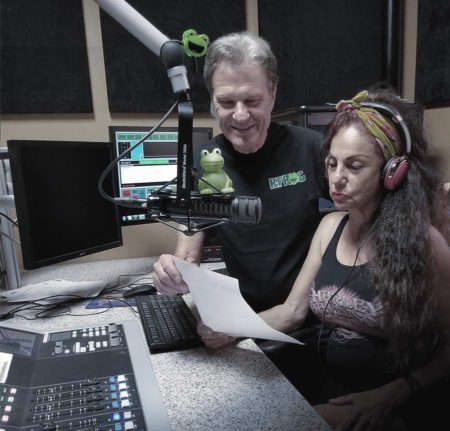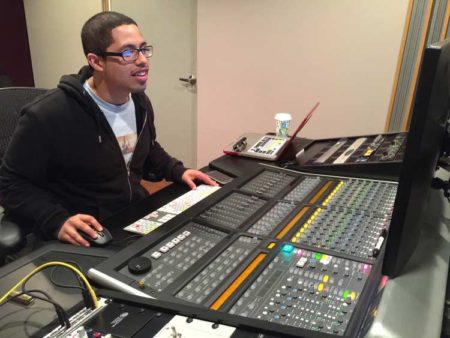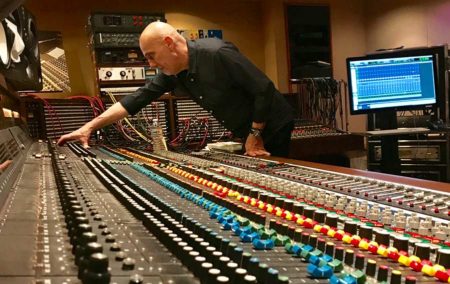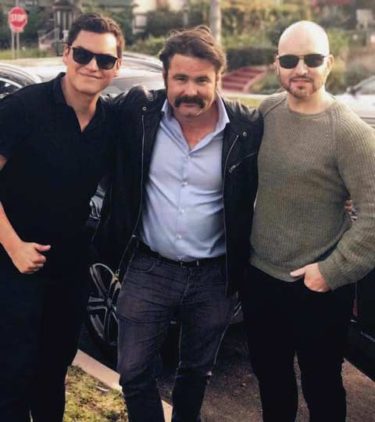Please fill out the following information, and RRFC Admissions will contact you to discuss our program offerings:
Issue #185
by L. Swift and Jeff McQ
 The journey into radio can be a winding road. For Gypsy Marie Fimbres, that road led from bartending to college, then to self-discovery.
Gypsy Marie first decided to pursue broadcasting while tending bar at some of L.A.’s famous haunts like Whisky-a-Go-Go and the Rainbow Bar & Grill. To her, it was a chance to share her infectious personality, humor, and to make a name for herself in the world. “Television and broadcasting news, I love it, but on radio I can be more relaxed,” she says. “It’s not so uptight. It’s not so rigid. It’s kind of like, do your thing. I like doing my thing and I like yapping.”
Gypsy Marie says it all started with a bet with one of her best friends as to who would become famous first. Her unnamed friend went on to become a legendary rock star, winning the bet. Not to be outdone, Gypsy Marie went to Chapman University to study broadcasting, but as she approached graduation she became dismayed when she realized her education gave her no pathway to break into the business.
“Once I was done with Chapman,” she says, “the professors and everybody [said] to me, ‘Where do you want to go from here?’ I go, ‘Good question. I should be asking you guys this question instead of you asking me.’ They go, ‘Good luck.’…Hello? Where do I go from here? Do you guys want me to finish paying this tuition with no work?”
At this point, her path into broadcasting took an interesting side turn, with an opportunity coming from an unexpected direction. During an exercise at an anthropology class at Chapman University, Gypsy Marie discovered she was one-quarter Native American, of the Pascua Yaqui tribe, and that her grandmother had played a key role in the tribe.
Over the coming months, she took the initiative and got a spot on a Native American internet radio station with a small, yet dedicated demographic , what she calls “a good learning and launching pad…You know, you can make mistakes and you can be able to go on and talk and stuff. So it got me to get my stuff together. Then I started putting my resume and tape together.”
From there, she says she made contact with Yoemi Radio, KPYT-FM, the radio station of the Pascua Yaqui reservation, and spoke with the station manager, Hector Youtsey. “I went to the reservation,” she says, “and I called up Hector and said, ‘Hey, I’ve got my own little radio show already. I’m used to the mike, so it’s not like I have stage fright here. So I’m ready to rock and roll.’ So he goes, ‘Come on down to the studio.’”
That opportunity led to regular visits to the reservation to appear on the radio show, but Gypsy Marie soon found its limitations. “That’s what kind of opened up the door for me,” she says. “[but] I wanted to look for a bigger market, and I kept on hitting stone walls, stone walls.”
That’s when she discovered the Radio Connection. When Gypsy Marie found out she could train on-the-job with a working radio professional, she saw her opportunity to get the skills and connections she would need to connect with a larger market. She decided to enroll, and was placed with Radio Connection mentor Marshall Thomas at K-FROG 95.1-FM in the San Bernardino area.
“I love Marshall,” she says. “He is down to earth, and what I like about him, he pulls no punches with his criticism, which only makes you better.”
Gypsy Marie says her experience with Marshall has also helped her improve her game. “The foundation that he has guided me through was really awesome,” she says. “He showed me some really good, cool vocal/voice exercises to do, warmups before you go on air. “He got me on his herbal diet…because of the fact that he wants my vocal cords to be slick and he wants that sultry voice…He showed me how to prepare, write, and get my stories together.”
Now focusing more fully on her career, Gypsy Marie is still learning more about her Native American roots and even has plans for an upcoming documentary with her former anthropology professor about her discovery and the story of how she found her family. In the meantime, she continues turning her goals into reality one step at a time.
“I want my star on Hollywood and Vine,” she says. “I want to be able to do a lot of cool things and give back to the community… I want to be able to get out there to a large, large audience.”
The journey into radio can be a winding road. For Gypsy Marie Fimbres, that road led from bartending to college, then to self-discovery.
Gypsy Marie first decided to pursue broadcasting while tending bar at some of L.A.’s famous haunts like Whisky-a-Go-Go and the Rainbow Bar & Grill. To her, it was a chance to share her infectious personality, humor, and to make a name for herself in the world. “Television and broadcasting news, I love it, but on radio I can be more relaxed,” she says. “It’s not so uptight. It’s not so rigid. It’s kind of like, do your thing. I like doing my thing and I like yapping.”
Gypsy Marie says it all started with a bet with one of her best friends as to who would become famous first. Her unnamed friend went on to become a legendary rock star, winning the bet. Not to be outdone, Gypsy Marie went to Chapman University to study broadcasting, but as she approached graduation she became dismayed when she realized her education gave her no pathway to break into the business.
“Once I was done with Chapman,” she says, “the professors and everybody [said] to me, ‘Where do you want to go from here?’ I go, ‘Good question. I should be asking you guys this question instead of you asking me.’ They go, ‘Good luck.’…Hello? Where do I go from here? Do you guys want me to finish paying this tuition with no work?”
At this point, her path into broadcasting took an interesting side turn, with an opportunity coming from an unexpected direction. During an exercise at an anthropology class at Chapman University, Gypsy Marie discovered she was one-quarter Native American, of the Pascua Yaqui tribe, and that her grandmother had played a key role in the tribe.
Over the coming months, she took the initiative and got a spot on a Native American internet radio station with a small, yet dedicated demographic , what she calls “a good learning and launching pad…You know, you can make mistakes and you can be able to go on and talk and stuff. So it got me to get my stuff together. Then I started putting my resume and tape together.”
From there, she says she made contact with Yoemi Radio, KPYT-FM, the radio station of the Pascua Yaqui reservation, and spoke with the station manager, Hector Youtsey. “I went to the reservation,” she says, “and I called up Hector and said, ‘Hey, I’ve got my own little radio show already. I’m used to the mike, so it’s not like I have stage fright here. So I’m ready to rock and roll.’ So he goes, ‘Come on down to the studio.’”
That opportunity led to regular visits to the reservation to appear on the radio show, but Gypsy Marie soon found its limitations. “That’s what kind of opened up the door for me,” she says. “[but] I wanted to look for a bigger market, and I kept on hitting stone walls, stone walls.”
That’s when she discovered the Radio Connection. When Gypsy Marie found out she could train on-the-job with a working radio professional, she saw her opportunity to get the skills and connections she would need to connect with a larger market. She decided to enroll, and was placed with Radio Connection mentor Marshall Thomas at K-FROG 95.1-FM in the San Bernardino area.
“I love Marshall,” she says. “He is down to earth, and what I like about him, he pulls no punches with his criticism, which only makes you better.”
Gypsy Marie says her experience with Marshall has also helped her improve her game. “The foundation that he has guided me through was really awesome,” she says. “He showed me some really good, cool vocal/voice exercises to do, warmups before you go on air. “He got me on his herbal diet…because of the fact that he wants my vocal cords to be slick and he wants that sultry voice…He showed me how to prepare, write, and get my stories together.”
Now focusing more fully on her career, Gypsy Marie is still learning more about her Native American roots and even has plans for an upcoming documentary with her former anthropology professor about her discovery and the story of how she found her family. In the meantime, she continues turning her goals into reality one step at a time.
“I want my star on Hollywood and Vine,” she says. “I want to be able to do a lot of cool things and give back to the community… I want to be able to get out there to a large, large audience.”
 RRFC: So tell us a little of your backstory. What got you interested in music and engineering in the first place?
Victor Abreu: I’ve always been interested in music growing up…About seven years ago, I had good friends of mine that were into producing music. They were using FL Studio at the time, and I kind of dove into learning it myself…I loved music at that time, but I fell in love with it all over again when I started to learn about mixing and recording different instruments and the studio environment. From there, I realized what my goal was, to become an engineer at a studio and work on records.
RRFC: How long have you been at Clear Track now?
Vic: Two years. I started at Clear Track as an intern…I started from the very bottom, started out cleaning their toilets.
RRFC: And you worked your way up?
Vic: Yeah…Clear Track was an awesome opportunity. I remember when I was going to school, that was the name that everyone was—only a very few people could intern at Clear Track…and I was one of the students. I would say in my personal experience, I’ve learned more interning at Clear Track, as far as practical applications in the studio, I learned more as an intern than I did going to school…interning at Clear Track was a huge learning experience, because I went from interning there to becoming an Assistant Engineer, and now I’m one of the staff engineers.
RRFC: It sounds like you had a very humble, willing-to-do-anything sort of attitude.
Vic: Yes, most definitely.
RRFC: Do you think that’s essential for people who want to make it in this industry?
Vic: Yes, and personally, it’s how you make it in any kind of industry. I think it’s exactly how you described it, that kind of attitude, to just keep plugging away…What makes people successful is putting in their hours, putting in the time, the 10,000 hours that it takes, in and outside of the class environment. And that’s what I always made sure I was doing. I have a little studio in my home too where I’m doing the same thing that I’m doing at the studio, constantly, because that’s what it takes if you want to become a master at something. You have to put in those 10,000 hours.
RRFC: It must be pretty cool to be a teacher now and see the light bulbs go off when you’re teaching.
Vic: It’s actually wonderful, yeah. I love it. Without trying to sound corny or anything, I love that…It’s like falling in love with music all over again. That’s how I describe it really, because you think you know so much about music and your life is basically centered around it, and then you learn much more about it, much more than you thought you knew.
RRFC: We often hear two different opinions on how to be successful in the industry. Some say if you want to work in music today, you have to be a jack-of-all-trades in the studio; others say you just need to focus on one thing. What’s your opinion?
Vic: I think it’s more or less being a jack of all trades, because it’s become the same thing for artists as well…because certain opportunities will arise, especially in the music industry. I remember times where there was a session where someone needed something done in Ableton, and I was able to do it because I know how to use Ableton even though the whole project was being done in Pro Tools…I know how to play piano as well, so sometimes an opportunity will come up where we need a chord progression for this bridge. How do we come up with that? If someone knows how to play the piano, especially the engineer, then that works both ways.
RRFC: What are your thoughts on studio etiquette or working with artists? Like how one should handle artists, how one should vibe what the artist wants from them?
Vic: If you’re just comfortable with people, it becomes very easy. Sometimes, an artist will come in to sing, and I understand that singing isn’t a robotic thing…They have to feel comfortable at some rate when they stand in front of the microphone and sing and do it well. It takes some kind of passion, you know. To be comfortable around people, I feel like that creates that environment to where the artist is able to perform, because that moment when you hit record is a very important moment; that’s what makes a record great. When you think about David Bowie and all the times he sung, those moments when they were recording him and he was able to just sing the way he was able to sing, that’s timeless. So it’s all just based on being comfortable. They’re there to make music, you’re there to make music as well.
RRFC: Have any Recording Connection students been impressing you lately?
Vic: Reece Corarito. He was one of my first students. I’m actually waiting on him to begin his master class with me, because he would be the first one I would conduct the master class with…He just had a good grasp, he was able to get a good sound with his own style. Pretty much for me he’s a natural…He’s extremely talented, very talented producer, and very humble as well, and very, very smart…I have 3 students right now that are 22 and younger. I have one that’s 18. He’s another student that’s extremely talented…James Hernandez. Way, way ahead of his time.
RRFC: In your opinion, what can students in the program do to make the best of the opportunity while they’re going through Recording Connection?
Vic: What I always try to tell them about the whole 10,000 hours thing is to just trust the process. That’s the time you put in to become great. Create opportunities for yourself in the different places that you want to go. Continue that same attitude when you reach that point, and when you reach the next point. Just trust the process. Continue to do what you know how to do best, and everything else pretty much falls into place.
RRFC: So tell us a little of your backstory. What got you interested in music and engineering in the first place?
Victor Abreu: I’ve always been interested in music growing up…About seven years ago, I had good friends of mine that were into producing music. They were using FL Studio at the time, and I kind of dove into learning it myself…I loved music at that time, but I fell in love with it all over again when I started to learn about mixing and recording different instruments and the studio environment. From there, I realized what my goal was, to become an engineer at a studio and work on records.
RRFC: How long have you been at Clear Track now?
Vic: Two years. I started at Clear Track as an intern…I started from the very bottom, started out cleaning their toilets.
RRFC: And you worked your way up?
Vic: Yeah…Clear Track was an awesome opportunity. I remember when I was going to school, that was the name that everyone was—only a very few people could intern at Clear Track…and I was one of the students. I would say in my personal experience, I’ve learned more interning at Clear Track, as far as practical applications in the studio, I learned more as an intern than I did going to school…interning at Clear Track was a huge learning experience, because I went from interning there to becoming an Assistant Engineer, and now I’m one of the staff engineers.
RRFC: It sounds like you had a very humble, willing-to-do-anything sort of attitude.
Vic: Yes, most definitely.
RRFC: Do you think that’s essential for people who want to make it in this industry?
Vic: Yes, and personally, it’s how you make it in any kind of industry. I think it’s exactly how you described it, that kind of attitude, to just keep plugging away…What makes people successful is putting in their hours, putting in the time, the 10,000 hours that it takes, in and outside of the class environment. And that’s what I always made sure I was doing. I have a little studio in my home too where I’m doing the same thing that I’m doing at the studio, constantly, because that’s what it takes if you want to become a master at something. You have to put in those 10,000 hours.
RRFC: It must be pretty cool to be a teacher now and see the light bulbs go off when you’re teaching.
Vic: It’s actually wonderful, yeah. I love it. Without trying to sound corny or anything, I love that…It’s like falling in love with music all over again. That’s how I describe it really, because you think you know so much about music and your life is basically centered around it, and then you learn much more about it, much more than you thought you knew.
RRFC: We often hear two different opinions on how to be successful in the industry. Some say if you want to work in music today, you have to be a jack-of-all-trades in the studio; others say you just need to focus on one thing. What’s your opinion?
Vic: I think it’s more or less being a jack of all trades, because it’s become the same thing for artists as well…because certain opportunities will arise, especially in the music industry. I remember times where there was a session where someone needed something done in Ableton, and I was able to do it because I know how to use Ableton even though the whole project was being done in Pro Tools…I know how to play piano as well, so sometimes an opportunity will come up where we need a chord progression for this bridge. How do we come up with that? If someone knows how to play the piano, especially the engineer, then that works both ways.
RRFC: What are your thoughts on studio etiquette or working with artists? Like how one should handle artists, how one should vibe what the artist wants from them?
Vic: If you’re just comfortable with people, it becomes very easy. Sometimes, an artist will come in to sing, and I understand that singing isn’t a robotic thing…They have to feel comfortable at some rate when they stand in front of the microphone and sing and do it well. It takes some kind of passion, you know. To be comfortable around people, I feel like that creates that environment to where the artist is able to perform, because that moment when you hit record is a very important moment; that’s what makes a record great. When you think about David Bowie and all the times he sung, those moments when they were recording him and he was able to just sing the way he was able to sing, that’s timeless. So it’s all just based on being comfortable. They’re there to make music, you’re there to make music as well.
RRFC: Have any Recording Connection students been impressing you lately?
Vic: Reece Corarito. He was one of my first students. I’m actually waiting on him to begin his master class with me, because he would be the first one I would conduct the master class with…He just had a good grasp, he was able to get a good sound with his own style. Pretty much for me he’s a natural…He’s extremely talented, very talented producer, and very humble as well, and very, very smart…I have 3 students right now that are 22 and younger. I have one that’s 18. He’s another student that’s extremely talented…James Hernandez. Way, way ahead of his time.
RRFC: In your opinion, what can students in the program do to make the best of the opportunity while they’re going through Recording Connection?
Vic: What I always try to tell them about the whole 10,000 hours thing is to just trust the process. That’s the time you put in to become great. Create opportunities for yourself in the different places that you want to go. Continue that same attitude when you reach that point, and when you reach the next point. Just trust the process. Continue to do what you know how to do best, and everything else pretty much falls into place.

Active listening going on at Csaba Petocz Master Class at Sunset Sound

8 time Grammy-award-winning producer Joe Chiccarelli

Film Connection student Juan Armijos, actor Mickey Gooch Jr. and mentor filmmaker Rob Weston on the set of Madness in the Method

RRFC is education upgraded for the 21st century.
Get the latest career advice, insider production tips, and more!
Please fill out the following information, and RRFC Admissions will contact you to discuss our program offerings:
Stay in the Loop: Subscribe for RRFC news & updates!
© 2024 Recording Radio Film Connection & CASA Schools. All Rights Reserved.


